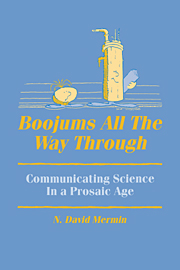Book contents
- Frontmatter
- Contents
- Preface
- I Reflections on the pursuit of physics
- 1 E pluribus boojum: The physicist as neologist
- 2 Commencement address, St. Johns College, Santa Fe, May 18, 1986
- 3 “One of the great physicists … and great characters”
- 4 My life with Landau
- 5 What's wrong with this Lagrangean?
- 6 What's wrong with this library?
- 7 What's wrong with this prose?
- 8 What's wrong with these equations?
- 9 What's wrong with these prizes?
- II The quantum theory
- III Relativity
- IV Mathematical musings
9 - What's wrong with these prizes?
Published online by Cambridge University Press: 02 December 2009
- Frontmatter
- Contents
- Preface
- I Reflections on the pursuit of physics
- 1 E pluribus boojum: The physicist as neologist
- 2 Commencement address, St. Johns College, Santa Fe, May 18, 1986
- 3 “One of the great physicists … and great characters”
- 4 My life with Landau
- 5 What's wrong with this Lagrangean?
- 6 What's wrong with this library?
- 7 What's wrong with this prose?
- 8 What's wrong with these equations?
- 9 What's wrong with these prizes?
- II The quantum theory
- III Relativity
- IV Mathematical musings
Summary
But “glory” doesn't mean “a nice knock down argument.”
Alice to Humpty Dumpty.
It seems to me evident that the system of prizes, honors and awards in physics has run completely amok, absorbing far too much of the time and energy of the community in proportion to the benefits conferred. Yet nobody complains. Every month Physics Today routinely announces the latest crop of winners, all the major American Physical Society meetings have sessions to bestow prizes, the APS directory continues to distinguish the asterisked from the unasterisked, and nobody ever complains. Why?
To ask the question is to answer it. Indeed, merely by publishing the above paragraph I have probably already irreparably blemished my reputation in the profession, and if Physics Today has actually printed this column I imagine it can only have been after heated and prolonged editorial debate. Much of this essay, in fact, sat aging in my computer in a directory with highly restricted access for almost two years. It was finally sprung loose by the 1988 Presidential campaign, which filled me with so intense a loathing for those who hesitate to speak provocative truths that I can no longer restrain myself. Here I go.
Why does nobody ever complain? Nobody complains because there are two categories of physicists: those who have won prizes and those who have not. Winners cannot criticize the system. It would be rude to the donors of their prizes. It would be offensive to the committee that selected them and the people who wrote letters on their behalf. It would be a vulgar display of bad taste.
- Type
- Chapter
- Information
- Boojums All the Way throughCommunicating Science in a Prosaic Age, pp. 74 - 78Publisher: Cambridge University PressPrint publication year: 1990



